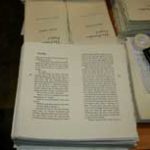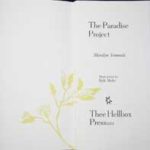Paradise unfolding
Nobody crafts words like Merilyn Simonds. If you’re a word-craft-lover, I think you would very much enjoy reading about the evolution of The Paradise Project: her collection of flash fiction, now being printed in slow motion by letterpress …

… on St. Armand’s mold-made “salad” paper, with endpapers made from her garden and lino cut illustrations made by her son, artist Erik Mohr.

The Paradise Project is a collection of her award-wining short stories with gardens at their core, a bed-rock of imagery that is always with her.
Merilyn on the “easy” work of writing:
It is an easy job, at least on those days when the words are there lining up, compliant, but feisty, too. Even when they aren’t, when I spend hours lugging commas from here to there, shovelling in new phrases, axing them out again, prying words apart, wedging in fresh ones, even then what survives always looks easy. The better the writing, the easier it looks.
Merilyn writes evocatively, emotionally, sparely. If you’re like me, you’ll tear up as well.

The Paradise Project is being hand-published by Hugh Barclay, book artist and owner of Thee Hellbox Press. “I’m working on the last signature and I hope to put the press to bed on July 15th, providing that the stars and the moon are properly aligned.”
I long ago put in an order for one of these precious books. There won’t be many such. (Only three hundred, in fact.)
“Books of this artistic quality are only published about every 10-20 years and normally sell for 4-5 times what we are asking,” notes Hugh. The books are selling for $150 (about the cost of a forgetable night out in Toronto). If you are interested, e-mail Hugh to reserve a copy:
![]()
Late-breaking news: because I put in my order long ago, my copy is book #1!!!


